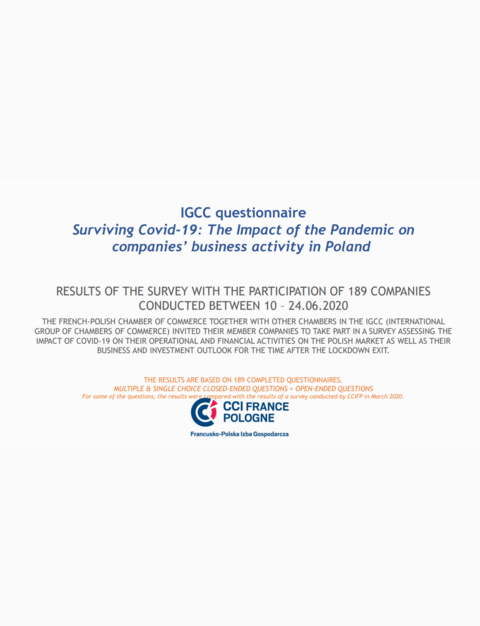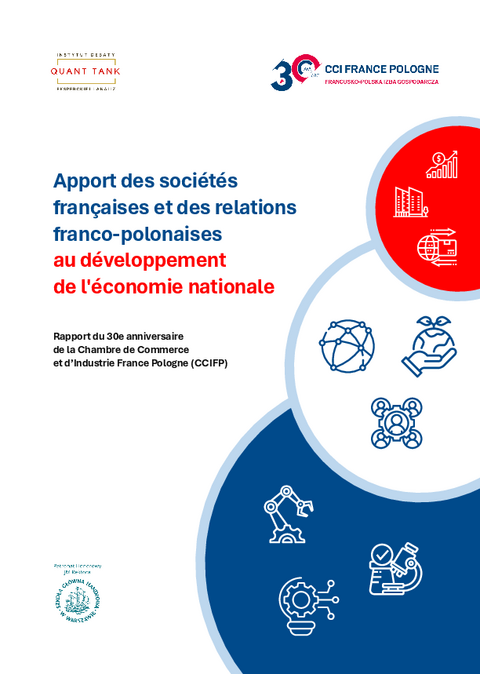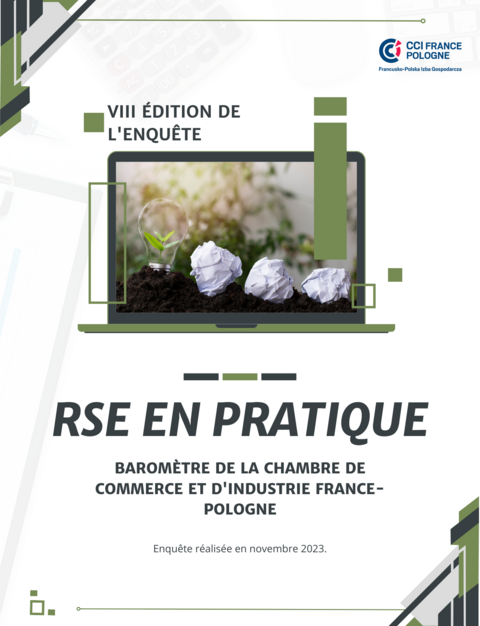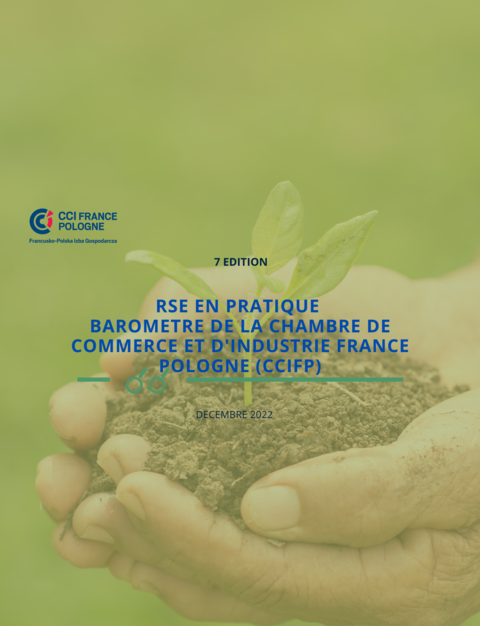
ESG en pratique – Baromètre CCIFP 2024
La Chambre de Commerce et d’Industrie France-Pologne (CCIFP) a publié les résultats de la neuvième édition de son étude phare, « ESG en pratique –...
Les entreprises réduisent leurs coûts et cessent d'investir, mais la récession ne touchera pas tout le monde. Résultats de la 2e enquête sur l'impact de la pandémie sur les entreprises. Juin 2020.
Four out of five of firms expect worse-than-planned financial results at the end of this year, according to a survey carried out by bilateral chambers of commerce in Poland. Nearly 90% have already reported a decrease in sales. A return to pre-pandemic levels will be possible at the earliest within the next six to 12 months, although some industries expect recession to last into 2021. In most cases, firms’ bankruptcy-prevention strategies are based on cost cutting (mainly those unrelated to their core business); laying off employees is seen as a mean of last resort.
The French-Polish Chamber of Commerce (CCIFP) together with other bilateral chambers in the International Group of Chambers of Commerce (IGCC) carried out a survey among Polish and foreign firms concerning the impact of Covid-19 on business activity in Poland. Fieldwork was conducted between 10 and 24 June. Results were compared with a similar study carried out by the CCIFP when the first restrictions were implemented. The data, gathered as businesses adapted to lockdown, highlights the biggest problems encountered by firms in the last three months, emphasising the concerns brought to light in the earlier survey.
“As shown in the June survey results, nearly 90% of the companies recorded a decrease in sales, with one in four of those surveyed declaring decreases of over 25%. This is due to the temporary shop closures and restrictions on consumer purchases, as well as the prevailing uncertainty in the market and the suspension of spending by companies, which in turn has resulted in a decrease in turnover in the B2B segment and across all business services,” says Monika Constant, executive director of the French-Polish Chamber of Commerce (CCIFP).
She adds: “Compared to the survey conducted in March, we can now clearly notice that a significant majority of companies can determine the level of those decreases, and can now start to take corrective action and implement changes in their business strategy for the coming months.”
Companies face cancelled orders but payments from customers are not being delayed
The biggest problem that entrepreneurs faced over the past three months has been the cancellation of orders by customers (51% of responses). Concerns voiced by the majority of firms in the March survey, in which 50% of respondents predicted that orders will be cancelled, have proved true. Delayed payments from customers or delayed execution of orders ultimately affected fewer companies than predicted in the first survey (27% and 29% of responses in June, compared to 56% and 41% in March respectively). Production output, on the other hand, fell on a slightly larger scale than expected (28% of indications in June vs 21% in March).
As 38% of respondents pointed out, travel restrictions and closed borders represented a major obstacle for businesses, especially for companies operating across multiple markets. This has led to the necessity of remote management of companies, and created problems with document flow, such as the signing of physical documents or contracts.
The situation was better than expected in the logistics sector. Nearly half of the respondents did not report experiencing a significant negative impact of Covid-19, a result nearly 10% better than in early March. Only one in three companies reported problems with the delivery of products from Polish and/or foreign suppliers. Issues with the transport of goods inside the country or associated shortages in inventories occurred in only 10% of companies.
Companies will be cutting costs at least until the end of the year
As a consequence of the drop in sales, companies have taken measures to reduce expenses and operating costs to maintain liquidity. 52% of companies have already reduced expenses unrelated to their core business, in areas such as marketing, advertising or training, and nearly 40% will continue to do so in the coming months. The scale of these cuts is significant, as in nearly two-thirds of the cases they amounted to more than 50% of the original budgets for these activities. Other measures taken by companies are: recruitment freeze (45% of responses); salary-increase freeze (37%) and bonus freeze (28%). Salaries were reduced in 29% of companies (usually by between 5-20%); however, only 17% of them plan to keep those reductions in the following months.
Companies are trying to protect existing jobs at all costs and, despite the decline in turnover, with redundancies seen as a last resort. So far, 15% of companies have declared laying off between 2-10% of their employees. In more than half of the companies, the epidemic has affected their ongoing or planned investments; most have been suspended or postponed until next year. This concerns all areas of investment, from corporate expansion – the establishment of new branches or production plants – to the purchase of new equipment, or staff development and training. Only those investments already well advanced seem to have a chance of being completed.
“Although statistically speaking, seven out of eight surveyed firms confirm that the coronavirus pandemic has had a negative impact on their operations, it’s also clear that a large part of them have managed well in this crisis situation. Relatively few have laid off employees or still anticipate redundancies – instead, they tend to focus on maintaining their core business while looking for savings in other, secondary areas, such as marketing,” says Dr Lars Björn Gutheil – executive director and board member of the Polish-German Chamber of Industry and Commerce.
Perspectives remain negative, although not for everyone
In comparison to the March survey, more companies are able to estimate the scale of the impact of coronavirus on their annual financial results (in March more than 60% of companies expected the results to deteriorate, but were not able to determine by how much). Nearly a third of respondents have already experienced a decrease of up to 20%. One in five firms expect it to be even higher. Compared to March, however, the percentage of firms declaring that their financial result at the end of the year will be the same or better has increased (18% in June vs. only 6% three months earlier). A quarter of entrepreneurs cannot predict when their results will return to pre-pandemic levels, and 31% assume that this will happen no sooner than next year. “Some optimism can be seen at least in certain sectors. At the beginning of the pandemic most entrepreneurs did not know what would happen, and as the results of the June survey show, the dark scenarios painted out by some of them in March did not necessarily come true. However, some respondents are expecting their situation to deteriorate only in the following year,” says Ms Constant.
Visible changes will be implemented also in corporate organisation and management. More than 80% of the respondents declare that they will be adopting a significantly more flexible approach to combining various work styles; 56% of firms anticipate the more regular use of tools for remote participation in external meetings or conferences. There will also be a faster digitalisation of external (32%) and internal (38%) services, and on-line sales channels and e-commerce solutions are predicted to develop as well (26% of responses).“The results of the June survey confirm that Poles like working remotely. The percentage of firms introducing more flexible forms of work has increased by more than 20% since March. There’s also a greater willingness to digitise services, which will foster the development of new, innovative products and solutions for business,” says Joanna Jaroch-Pszeniczna, deputy director of the CCIFP.
Nearly half of the firms surveyed (48%) have benefited from the ‘anti-crisis shield’ measures offered by the Polish government. 43% of those firms positively assessed the aid granted; however, 54% said that the proposed solutions didn’t meet their expectations. Their main criticisms concerned complicated procedures, unclear rules and long waits for decisions. “Many problems result from the very management of the crisis at the national level. Requirements concerning the right to receive public aid were too strict, bureaucratic obstacles were too great, and finally the closing of borders – circumstances that have left many companies on the brink of survival. It is therefore crucial to optimise the aid given to entrepreneurs so that they can quickly overcome the crisis and preserve jobs.” stresses Dr Gutheil.
The survey Surviving Covid-19:The Impact of the Pandemic on Companies’ Business Activity in Poland was conducted by the French-Polish Chamber of Commerce among member companies of bilateral chambers of commerce in the IGCC (International Group of Chambers of Commerce). Respondents were CEOs, presidents, executive directors and board members. The results are based on questionnaires completed by 189 companies operating in Poland, 26% of which were Polish, 16% German, 14% French, 7% American, 6% Swiss, 5% Austrian; and 26% have the majority capital from various other countries. Nearly half of the respondents represented companies employing up to 50 people, 32% were medium-sized enterprises (51-500 employees) and 19% were companies employing over 500 people. Most respondents came from the following sectors: manufacturing industry (13%), construction & real estate (13%), business services (12%), consulting (8%), IT services and telecoms (7%) and trade and distribution (6%).
The French-Polish Chamber of Commerce (CCIFP) brings together over 450 companies with French and Polish capital and is one of the most active chambers of commerce in Poland. The main objective of the chamber is to contribute in the creation of the best possible conditions for investment and economic development in Poland, as well as to promote the best practices and business solutions. Last year, the Chamber realised that objective by organising over 130 various meetings. The French-Polish Chamber of Commerce was established in April 1994 on the initiative of French entrepreneurs and is a member of to the Association of French Chambers of Commerce and Industry (CCIFI) which associates 120 French Chambers across 90 countries. www.ccifp.pl
International Group of Chambers of Commerce: www.inwestycjezagraniczne.com
CONTACT: Mariusz Kielich, PR & communication manager, mariusz.kielich@ccifp.pl, tel: 0048 507 121 269
La Chambre de Commerce et d’Industrie France-Pologne (CCIFP) a publié les résultats de la neuvième édition de son étude phare, « ESG en pratique –...
Les entreprises françaises ont investi plus de 108 milliards de PLN en Pologne et une entreprise sur quatre coopère en permanence avec plus de 500...
CCIFP
84% des entreprises prennent des mesures pour lutter contre le changement climatique
CCIFP
La protection du climat, l'énergie propre et accessible et l'égalité des sexes sont les principaux défis que la Pologne devra relever dans les années...



